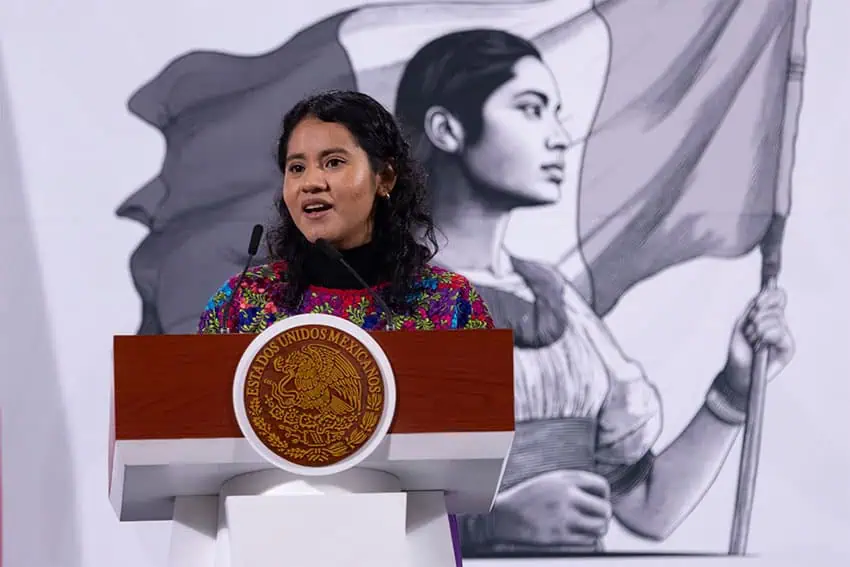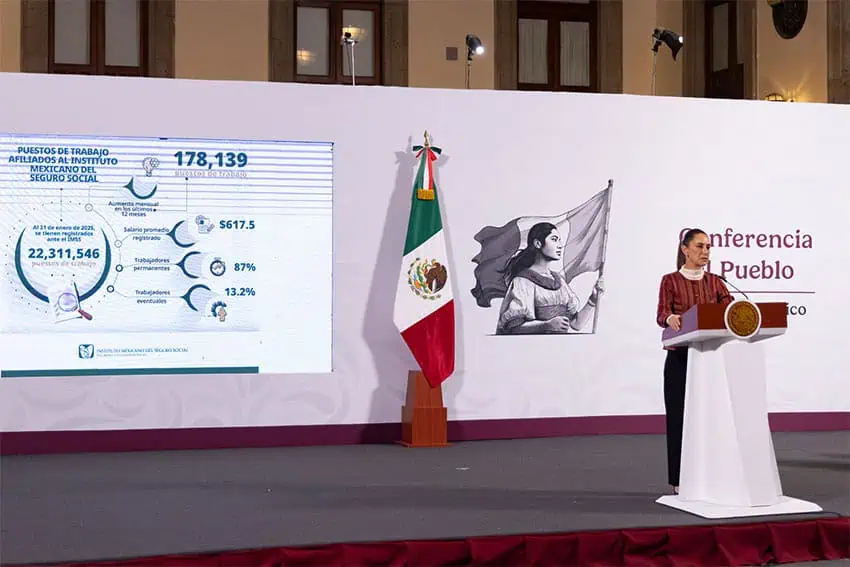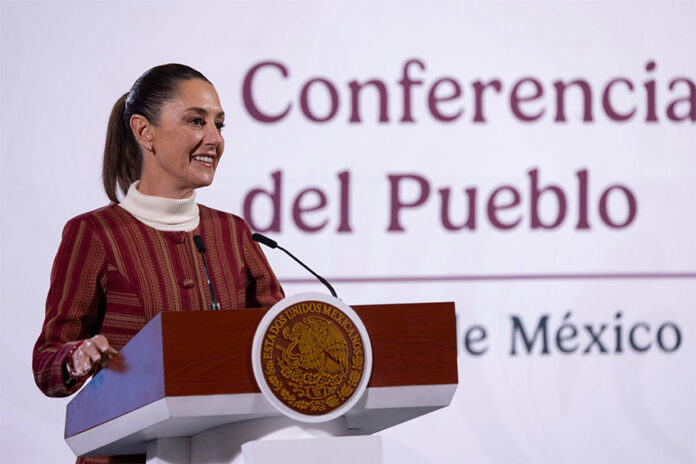President Claudia Sheinbaum opened her daily press conference on Friday by celebrating Indigenous women before addressing a broad variety of political issues, legislative concerns and legal items.
Also getting a mention was news that Sheinbaum’s pressers — officially titled “La Mañanera de Pueblo” (“The people’s morning report”) — was the most-viewed streaming program in Mexico.
Mexico’s Year of the Indigenous Woman
Before ceding the podium to Culture Minister Claudia Curiel de Icaza, Sheinbaum said one of her administration’s priorities is to reaffirm the important role Indigenous women have played throughout Mexico’s history. To start, she designated 2025 as the Year of the Indigenous Woman.
Curiel then outlined the lengthy series of events, exhibitions and activities Mexico is sponsoring at home and abroad. Among the most important is a September exposition in Madrid entitled “Mujeres mesoamericanas: Gobernadoras mexicanas” (“Mesoamerican women: Female Mexican governors”).
“We want people who live in Spain to understand the richness and greatness found in Mexico … before the Spaniards invaded our country,” she said. “The best way to demonstrate this is through our culture.”
Curiel said that it is impossible to understand Mexico without recognizing the daily contributions of Indigenous women both in the past and present.

“We can not understand a pluricultural country such as Mexico without recognizing the important role of Indigenous women … the grandmothers, mothers and daughters … and the part they play in transmitting ancestral knowledge,” she said.
Nadia López García, a director at the National Institute of Fine Arts and Literature (INBAL), said that special attention is being devoted to giving resonance to the voices of Indigenous women, their histories and their identity, particularly since there is a woman in the National Palace for the first time in Mexico’s history.
López García said the declaration of 2025 as the Year of the Indigenous Woman is an important step in the fight to defend Indigenous languages, the land, national memory, Mexico’s cuisine and its people.
Turning attention to the legislative process
As Mexico’s Congress reconvened to open its spring session this week, Sheinbaum briefly discussed some legislative initiatives she has submitted. She saved her most extensive comments, however, for a bill that she promised to veto should it be approved.
A Senate bill co-sponsored by her own Morena party would allow employers to garnish up to 40% of an employee’s salary to pay certain credits, including retirement funds, housing credits and per diems, or to reimburse the employer for loans or advances.
“Let me be clear: We are not in agreement here. Wages are untouchable,” Sheinbaum said. “I hope the Senate does not approve [this bill], but if it does I will veto it.”
There are other ways for credit companies and institutions to collect their funds, she said.

The president then outlined a few of her legislative proposals, including a bill to restore the prohibition against re-election that was enshrined in the 1917 Constitution.
Other proposals include a bill to crack down on nepotism, legislation to prohibit the cultivation of genetically modified corn, and an initiative to streamline the bureaucracy while reducing corruption.
The administration will also seek to make regulatory changes related to the importation and transportation of petroleum-based fuels as part of the government’s effort to eliminate rampant theft.
Defending her administration’s Pemex policy
When asked by a reporter about the nation’s low oil production figures in comparison to earlier administrations, Sheinbaum accused Presidents Vicente Fox (2000-2006) and Felipe Calderón (2006-2012) of being irresponsible.
“You can’t compare our policies with those followed in 2004,” she said, labeling Fox’s policies as being particularly excessive.
Sheinbaum said Fox — and later Calderón — overexploited oil fields and contaminated them by relying on the practice of injecting nitrogen to facilitate extraction.

So while production figures were quite high then — as much as 3.4 million barrels per day in 2004 — the result was that future production was compromised, she said.
“This policy of overexploitation [was short-sighted] and wells that might still be producing were used up prematurely,” she said.
In addition, this strategy makes it exceedingly more difficult — and more costly — to extract the entire deposit.
Sheinbaum also said that the overproduction produced significant profits, though much of it was not accounted for. “[This strategy] produced oil supplies and revenues but where this went we still do not know,” she said.
Current oil production sits at 1.7 million barrels per day, in line with the policies established by her predecessor Andrés Manuel López Obrador (1.8 million bpd) in an effort to maintain steady production. A portion of the profits are designated for renewable energy development.
The president also said that most of the oil produced now is targeted for domestic needs, unlike Fox and Calderón who focused on exporting Mexico’s oil.
President expresses gratitude to her online fans
On Thursday, the Streams Chart platform, a service that collates and registers viewers of streaming platforms, announced that the most popular stream within the YouTube Non-Gaming section in January was Sheinbaum’s daily press conference.
The “La Mañanera de Pueblo” registered 2.74 million listeners, according to the Streams Chart data.
Sheinbaum thanked those who listen to “La Mañanera de Pueblo,” helping her to become the most viewed YouTube streamer in the world, but deflected credit.
“[The popularity] has to do with the government and what we think and what we are doing,” she said.
As an example, the president’s press conference held at the National Museum of Anthropology on Jan. 7, hit a peak of 88,845 concurrent live viewers. The mañanero was staged at the museum to celebrate the opening of a new exhibition hall.
